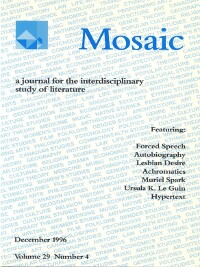Issue 29.4
Overview

General Issue
Published: December 1996
See the issue summary and contents below.
7 essays, totalling 136 pages
$15.00 CAD
From John Donne’s representation of Sappho’s lesbian desire to the future of hypertext and electronic literature, this general issue of Mosaic contains essays on theories of dialogue and speech; autobiography, style, and the knowing subject; colour theory, Samuel Beckett, and Georgia O’Keeffe; cultural anthropology and Ursula K. Le Guin; and the dramatization of the sociology of knowledge.
The Blind Sailor and Mr. Buckley: Forced Speech and Theories of DialogueAaron Fogel Using a psychoanalytical model, this essay explores the ideas that inform current theories of dialogue. Focusing on practical examples, ranging from Sophocles to television talk shows and the Hill-Thomas hearings, the essay argues the need to attend to unconscious rituals of forced speech. | |
Autobiography and Self-Deception: Conjoining Philosophy, Literature, and Cognitive PsychologyRoy W. Perrett Although autobiography is notoriously prone to self-deception, from a philosophical perspective the very notion of self-deception might seem to be strangely paradoxical. Drawing upon insights from cognitive psychology, this essay attempts to provide a plausible account of self-deception which elucidates the reconstructive features of autobiographical activity in the work of Rousseau, Mill, and, Sartre. | |
Depicting Lesbian Desire: Contexts For John Donne’s “Sapho to Philaenis”C. Annette Grisé This essay examines Donne’s “Sapho to Philaenis” in terms of Renaissance writings about the classical lesbian poet and female homosexuality. Focusing on the way that Donne revises and replaces Ovid’s poem about Sappho with his own, this essay argues that Donne both challenges and participates in Renaissance understandings of Sappho. | |
The Image of Thought: Achromatics in O’Keeffe and BeckettJennifer M. Jeffers Tracing the evolution of color theory, and noting the persistence of a traditionalist recourse to symbolism, this essay enlists the theories of Deleuze and argues for more attention to achromatics. Focus is on the black, white, and grey mindscapes produced by O’ Keeffe and Beckett, and the heteroclitic aspect of reading across the strata of the arts. | |
The Social Framework of Knowledge: Muriel Spark’s The Prime of Miss Jean BrodiePatrick J. Whiteley This essay shows how the sociology of knowledge illuminates Muriel Spark’s preoccupation with the social dynamics of knowledge and power. In her most well-known novel, Spark dramatizes the social mediation of knowledge, but in a manner that ultimately grounds her skepticism about the dangerous liaisons among knowledge, power, and loyalty. | |
Cultural Anthropology and Rituals of Exchange in Ursula K. Le Guin’s “Earthsea”W. A. Senior Ursula K. Le Guin’s four “Earthsea” novels exemplify the way that fantasy best models its fictional worlds by careful attention to details. Using theories from cultural anthropology, this essay examines the role of exchanges, specifically of gift-giving, in the construction of the “Earthsea” saga. | |
Cybernetic Esthetics, Hypertext and the Future of LiteratureMolly Abel Travis This essay analyzes the esthetics of the evolving genre of hypertextual fiction and argues that hypertext will survive as an art form only by incorporating graphic, auditory and cinematic effects and by providing the interactive, collaborative creativity of virtual-reality technology. Specific focus is on the hyperfiction of Michael Joyce, Carolyn Guyer, and Stuart Moulthrop. |